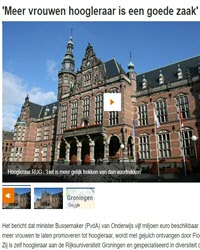Rink, Prof. Floor

Floor Rink is Professor of Organizational behaviour and Identity management at the Faculty of Economics and Business. In her research, she applies insights from intergroup identity theory to achieve important outcomes on work related phenomena that involve intra and inter-relational dynamics.
She has experience with conducting research on top management regulation, diversity and employee mobility that unifies the fields of psychology, management and economy. For example, she has yielded innovative findings on the economic benefits of diverse team settings and temporary staff in organizations, on variations in expected leadership behaviour across different economic conditions, on how to frame regulation practices and on the dynamic interplay between top managers and internal supervisors. In 2016 Rink was awarded a VIDI grant for her research project Internal and External Regulation of Top Management Decisions .
Previously in the news

-
Waarom vrouwen nog steeds mondjesmaat de top bereiken [Why women still only occasionally reach the top - article in Dutch]
-
Collega’s uit het buitenland, waar zijn die goed voor? [International colleagues, what are they good for? - article in Dutch]
-
Leiders met masculiene en feminiene kwaliteiten [Leaders with masculine and feminine qualities - article in Dutch]
